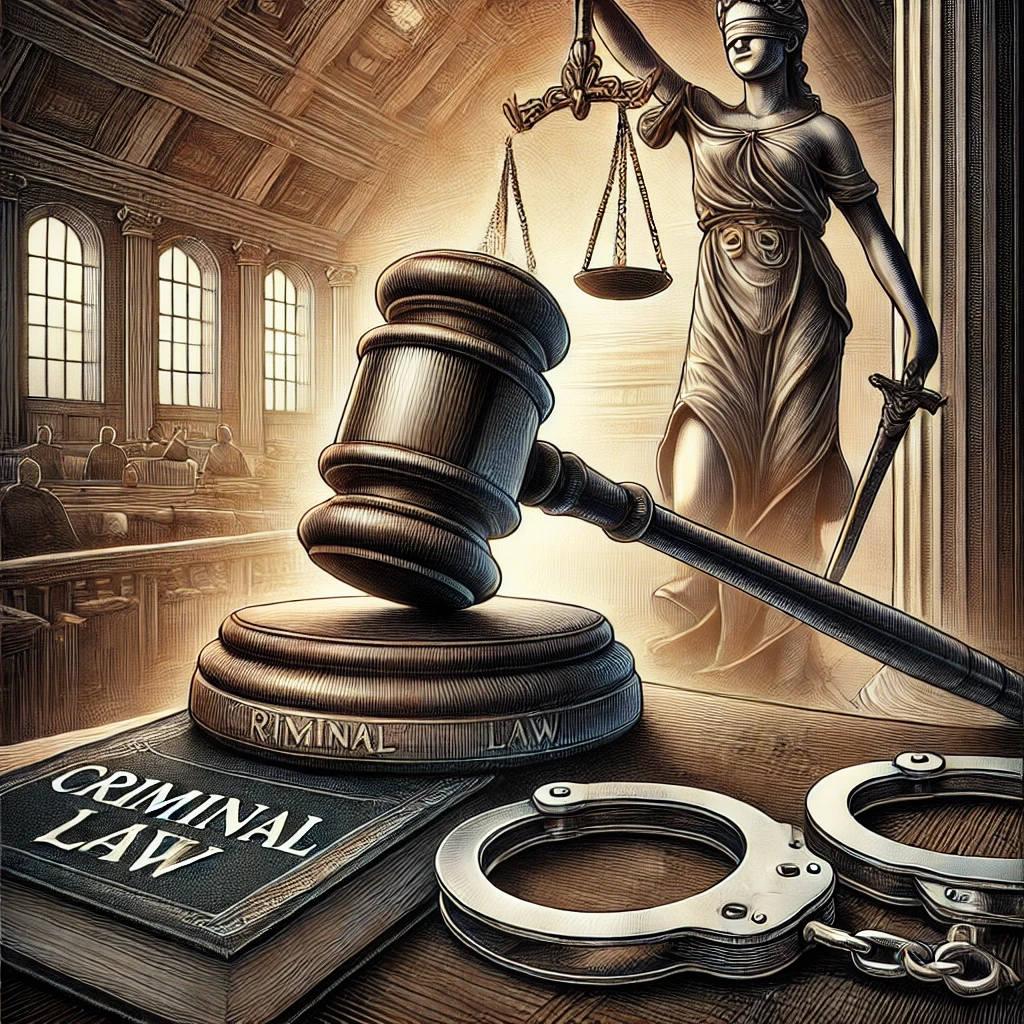Criminal Law
Criminal Law for Non-Lawyers: A Simplified Overview
Current Trends in Criminal Law: What You Need to Know
Understanding the Role of Prosecutors and Defense Attorneys
The Influence of Media on Public Perception of Criminal Law
Navigating the Appeals Process in Criminal Cases
The Impact of Criminal Law on Social Justice Issues
Understanding Felonies vs. Misdemeanors
The Role of Evidence in a Criminal Trial
How Juvenile Justice Differs from Adult Criminal Justice
The Impact of Criminal Records on Your Life
Criminal Law
When discussing the complex field of Criminal Law, it’s essential to understand its impact on society and the lives of individuals. This area of law encompasses various aspects, including legal rights, criminal charges, and defense strategies. Navigating through Criminal Law USA can often be overwhelming, particularly for those unfamiliar with its intricacies. What seems straightforward can quickly become complicated, thus highlighting the need for understanding this significant legal domain.

Main Points
- Types of crimes: felonies, misdemeanors, and infractions
- Criminal procedure and due process
- Rights of the accused
- Sentencing and punishment
- White-collar crimes
- Cybercrime and technology-related offenses
- Drug laws and policies
- Juvenile justice
- Recent landmark criminal cases and their implications

Types Of Crimes: Felonies, Misdemeanors, And Infractions
Understanding the different types of crimes is crucial, especially if you’re navigating criminal law USA. Not all offenses carry the same weight. Felonies, misdemeanors, and infractions differ significantly:
- Felonies: Serious crimes such as murder or robbery, often resulting in over a year of incarceration.
- Misdemeanors: Less severe than felonies, these may include petty theft or vandalism, typically leading to less than a year in jail.
- Infractions: Minor violations like traffic tickets that usually result in fines rather than jail time.
Each crime type carries unique consequences and implications. With the help of a knowledgeable criminal law attorney, you can navigate your rights and responsibilities effectively. Remember, understanding these distinctions can prevent serious legal confusion later.

Criminal Procedure And Due Process
Understanding criminal law is vital not only for those in legal professions but also for society as a whole. The process guarantees that individuals are treated fairly, ensuring justice prevails. However, many find the nuances confusing. Due process is a promise that everyone has certain rights when faced with criminal charges. Think about it: without proper criminal law procedures, the balance of justice could tip, leaving the innocent vulnerable. Many defense strategies hinge on these essential rights.
Key Elements of Due Process
| Aspect | Importance |
|---|---|
| Fair Trials | Essential for justice |
| Right to Counsel | Protects defendants |
| Evidence Presentation | Ensures transparent justice |
In conclusion, the intersection of criminal law and due process intertwines deeply, shaping the very fabric of our justice system. Recognizing this connection is crucial, as it not only affects judicial outcomes but resonates with our fundamental beliefs about fairness and equity.

Rights Of The Accused
The rights of the accused form a cornerstone of criminal law, ensuring every individual receives fair treatment. These crucial rights include the presumption of innocence, the right to legal counsel, and protection against self-incrimination. Understanding these rights is vital, not just for the accused, but for society at large. Unfortunately, many people are unaware of their rights during legal proceedings, leading to potentially life-altering implications. Additionally, the balance between public safety and individual rights creates a complex landscape in criminal law.

Sentencing And Punishment
The realms of sentencing and punishment are intricate webs of justice, shifting based on societal norms and legal interpretations. Courts aim to balance deterrence, rehabilitation, and retribution when imposing sentences. However, the impact of these decisions can ripple through communities. Some wonder if punishment truly serves its purpose or if it merely perpetuates cycles of crime. Moreover, disparities in sentencing often spark debate about fairness and equality in the system, challenging us to rethink our approaches.
Key Factors Influencing Sentencing
- Circumstances of the Crime: The details surrounding the offense often dictate the level of punishment.
- Criminal History: Repeat offenders typically face harsher sentences due to their past actions.
- Judicial Discretion: Judges have some leeway to impose sentences based on their interpretations of legal precedents.
Ultimately, understanding punishment requires a multi-faceted approach. It isn’t just about penalizing; it’s about fostering a safer society, ensuring justice is served while promoting rehabilitation. These elements intertwine to create an ever-evolving legal landscape, where each decision reflects the values and priorities of our communities.

White-Collar Crimes
White-collar crimes, often hidden behind corporate facades, include activities like fraud and embezzlement. These offenses typically involve deceit for financial gain, impacting not just companies but also innocent employees and shareholders. Surprisingly, many see them as less serious than street crimes, despite their significant consequences. The average person might think these criminals are merely clever, but in reality, their actions can dismantle lives and communities. Recognition of such crimes is vital for accountability.

Cybercrime And Technology-Related Offenses
In today’s digital age, cybercrime has become a pressing concern. From identity theft to phishing scams, technology-related offenses are on the rise. Individuals and organizations face increasing risks due to the sophistication of these crimes. For instance, hackers can manipulate personal data or disrupt critical systems. The consequences can be devastating. It’s essential for everyone to remain vigilant and employ strong security measures. As the landscape evolves, awareness becomes our best defense.
“The only way to deal with cybersecurity is to stay a step ahead of the threats lurking in the shadows.”
Understanding the Threats
Many struggle to grasp the full scope of these offenses. Needing to recognize potential pitfalls, users might mistakenly believe they are safe. However, cyber criminals constantly devise new techniques, exploiting weaknesses in our systems. It’s vital to grasp the nuances of technology and understand that even a small oversight could lead to significant problems.
| Crime Type | Description |
|---|---|
| Identity Theft | Stealing personal information to assume someone else’s identity. |
| Phishing | Fraudulent attempts to obtain sensitive information via deceitful emails. |
Recognizing these offenses is just the beginning. Continuous education and adaptation are crucial in this ever-changing landscape. Thus, open discussions about these issues become necessary. What are your concerns regarding cybercrime? Let’s dive deeper into this critical topic together.

Drug Laws And Policies
Drug laws play a crucial role in shaping societal attitudes towards substance use. These laws can vary dramatically from country to country, and even within regions of the same nation. Therefore, it’s essential to understand the complexities surrounding these regulations. Some argue that strict policies often perpetuate stigma, while others believe they protect public health. The balance between enforcement and compassion remains a contentious debate in modern society.
Key Aspects of Drug Policies
- Legalization: The process of making certain drugs legal can lead to various outcomes, both positive and negative. Many countries have embraced legalization as a means to control quality and reduce crime.
- Decriminalization: This approach typically reduces penalties associated with drug possession without fully legalizing the substance. It aims to minimize the legal consequences for users.
- Harm Reduction: This strategy focuses on minimizing the negative health effects associated with drug use rather than solely on preventing use. Programs may include safe injection sites and needle exchange programs.

Juvenile Justice
The juvenile justice system addresses offenses committed by minors, aiming to balance accountability and rehabilitation. It operates on the belief that young individuals can change. However, navigating this system is often puzzling. For instance, some argue that harsh penalties are sometimes enforced, contradicting the rehabilitative goal. Yet, the approach varies significantly between regions. Community programs and legal frameworks significantly influence the outcomes. Understanding these complexities is essential for advocating effective reforms in the justice process.
Recent Landmark Criminal Cases And Their Implications
The legal landscape is continuously shaped by noteworthy criminal cases that challenge societal norms. Recently, several landmark cases emerged, stirring debates and highlighting the intricate relationship between law and ethics. For instance, a pivotal case regarding digital privacy raised questions about the extent of government surveillance. This case’s implications ripple through both legal precedents and public perception, indicating a shifting attitude towards individual rights. It’s fascinating, yet perplexing, to consider how these developments will influence future legislation.
Impact on Public Perception
Moreover, the discussion surrounding these cases often creates a confusing narrative. People struggle to distinguish between justice and judgment. A landmark ruling may provoke outrage or support, but its consequences are far-reaching. For many, the connection to broader issues of equity and fairness adds layers of complexity. As society reflects on these issues, the pathway to reform appears both challenging and necessary.
You Can Also Review These:
criminal law | Wex | US Law | LII / Legal Information Institute
Criminal law – Wikipedia
Frequently Asked Questions
What is criminal law?
Criminal law is a body of law that relates to crime and punishment. It governs actions that are considered to be offenses against the state or public and establishes the legal standards for prosecution and defense.
What are the different types of crimes?
Crimes can be categorized into various types, including felonies (serious offenses), misdemeanors (less serious offenses), and infractions (minor violations). Additionally, they can be classified as property crimes, violent crimes, white-collar crimes, and drug-related offenses.
What is the difference between a felony and a misdemeanor?
A felony is a more serious crime that typically carries a punishment of imprisonment for more than one year, or death. A misdemeanor is a less serious offense, usually punishable by less than one year of jail time or fines.
What is the role of a defense attorney in criminal law?
A defense attorney represents individuals accused of a crime. Their primary role is to ensure the defendant’s rights are protected, provide legal counsel, and build a defense strategy to achieve the best possible outcome in the case.
What are the possible defenses in a criminal case?
Common defenses in criminal cases include insanity, self-defense, alibi, duress, entrapment, and lack of intent. The applicable defense will depend on the circumstances surrounding the case and the charges being faced.